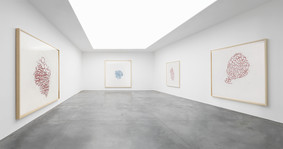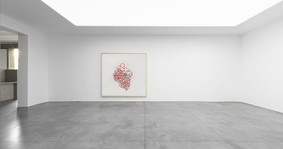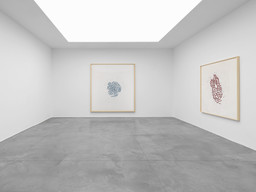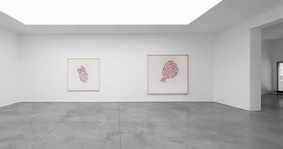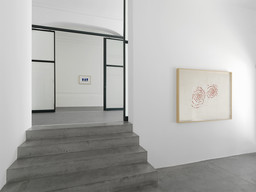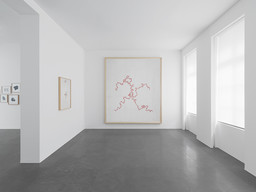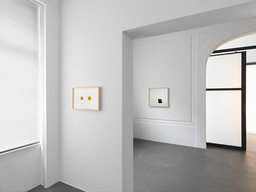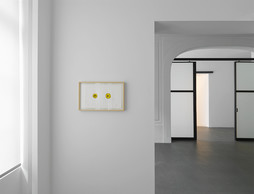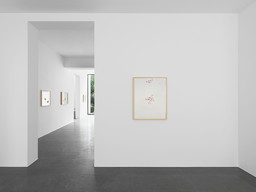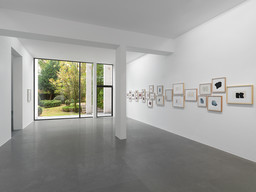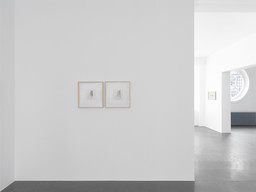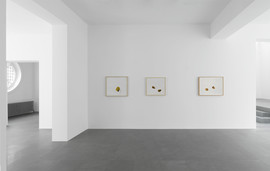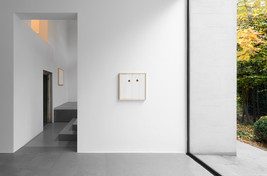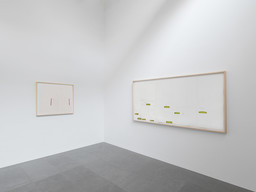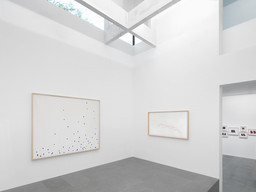Roni Horn: Selected Drawings 1984 - 2012
25 October—24 November 2012
6 rue St-Georges | St-Jorisstraat
| 1 | / | 15 |
×
‘If you were to ask me what I do, I would say I draw – this is the primary activity – and that all my work has this in common regardless of idiom or material.’ (Roni Horn in a letter to Paulo Herkenhoff, 2003)
Xavier Hufkens is pleased to announce the first survey exhibition dedicated solely to the pigment drawings of New York-based artist Roni Horn (b. 1955, New York). It is the artist’s fifth exhibition with the gallery and the works range from early pieces to new, intricate large-scale drawings, two of which have been especially created for the exhibition. These works move beyond the limitations of their medium and instead explore the materiality of colour and the sculptural potential of drawing.
Horn’s first drawings, which date to the mid 1980s, were made using pure pigment and feature groupings of uneven shapes. Whether semi-conical, semi-pyramidal, or semi-rectangular, the objects waver between easily identifiable geometric forms and abstract volumes. Each shape is densely filled with powdered pigment in gem-like shades of deep red, bright yellow and brilliant green. The pigment is applied to the paper in thick layers, mixed with small amounts of turpentine, and varnish is finally added, a little at a time. It is a laborious process that lends physicality and depth to the two-dimensional works.
An important feature of Horn’s work is her sculptural and photographic explorations into the implications of repetition and doubling. Early drawings such as Must 21 (1985) also represent a two-dimensional investigation into multiplicity, perception and memory. Must 21 depicts a group of dark grey, tapered cylindrical shapes flecked with green, red and white pigments. At first glance, they seem similar, but it becomes apparent that the shapes are not presented in a progressive or logical sequence. Instead, they contain a built-in repetition with minor variations, such as the multi-coloured traces of pigment, which require the viewer to commit their time and attention to unravelling the subtle differences.
Horn’s more recent drawings display a significant increase in scale and complexity. Each work is composed of separate drawings, or ‘plates’. Horn first cuts these plates and then stitches elements from them together, creating entirely new forms through continuous cutting and pasting. Light pencil marks are dispersed throughout the drawings, indicating the joins of different plates and recording names or random pairings of words. These annotations mark time, like a metronome, as Horn carries out her exploration of the drawing’s expansive surface. In her essay in Roni Horn aka Roni Horn, Briony Fer described Horn’s work as ‘complete with missing parts’, capturing ‘the sense of a total object that is all absorbing yet at the same time intractable in some way and, therefore, always incomplete. This refusal to deliver everything easily or quickly forces us to slow down and reflect: to hold on to that tenuous hold.’
Roni Horn’s most recent solo exhibitions include Photographien/Photographic Works at the Hamburger Kunsthalle, Germany (2011) and Well and Truly at the Kunsthaus Bregenz, Austria (2010). In November 2009, Horn’s comprehensive survey exhibition, Roni Horn aka Roni Horn opened at Tate Modern and travelled to Collection Lambert in Avignon, France (2009). Other important exhibitions include those at the Whitney Museum of American Art, New York (2009) and the Institute of Contemporary Art, Boston (2010). Horn’s works are featured in numerous major international institutions and collections including the Guggenheim Museum (NY), MOMA (NY), the Art Institute of Chicago, Tate Modern, the Hamburger Kunsthalle, the Kunsthaus Zürich and the Centre Georges Pompidou, Paris, France.
Related Exhibitions
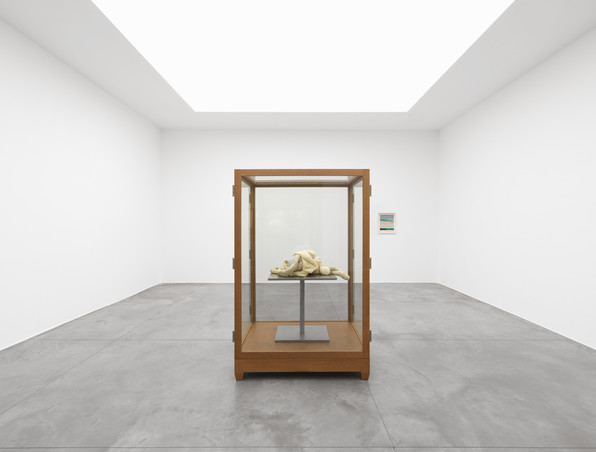
Louise Bourgeois, Thierry De Cordier,
Roni Horn, Alice Neel, Cathy Wilkes: Winterreise
22 January—29 February 2020
6 rue St-Georges | St-Jorisstraat
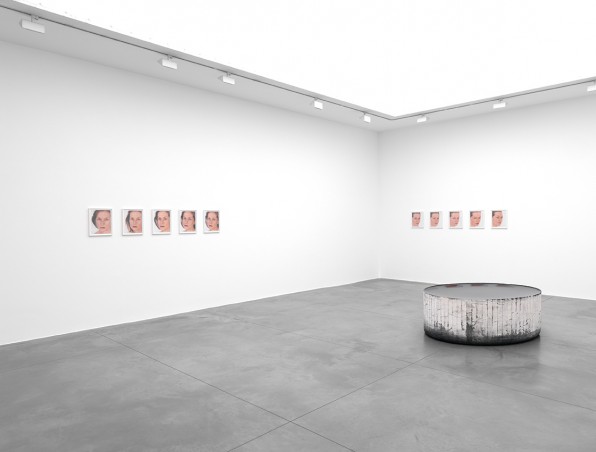
Roni Horn
20 May—14 June 2008
6 rue St-Georges | St-Jorisstraat
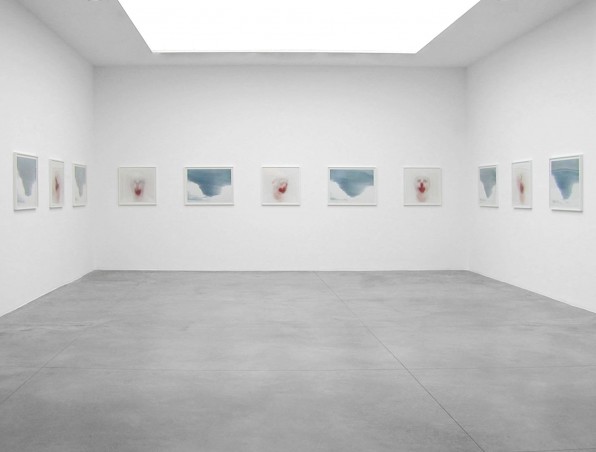
Roni Horn
8 November 2001—6 January 2002
6 rue St-Georges | St-Jorisstraat
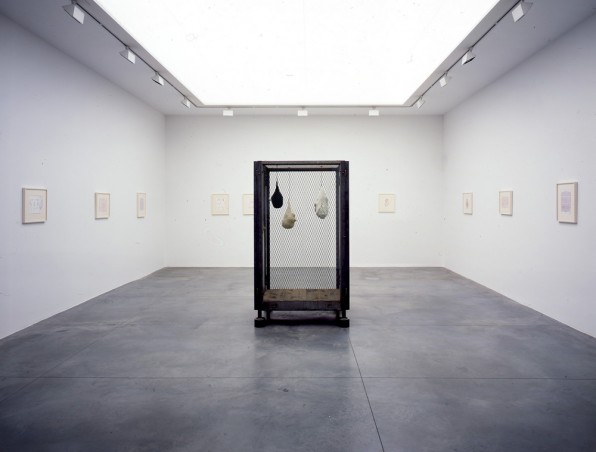
Richard Artschwager, Louise Bourgeois, Roni Horn, Allan McCollum
21 April—26 May 2001
6 rue St-Georges | St-Jorisstraat
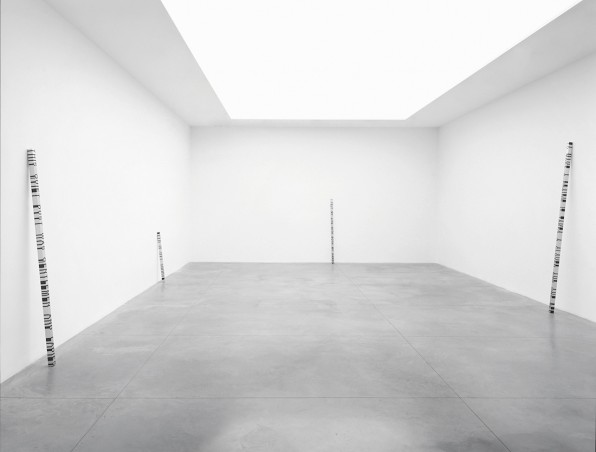
Roni Horn
29 October—12 December 1998
6 rue St-Georges | St-Jorisstraat
